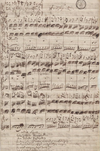- Was mein Gott will, das g'scheh allzeit
-
Cantate BWV 111 Was mein Gott will, das g'scheh allzeit Titre français Ce que Dieu veut arrive toujours Liturgie Épiphanie Création 1725 Auteur(s) du texte 1, 6 : Albrecht von Brandenburg
Texte original Traduction française de M. Seiler
Traduction française note à note
Traduction française interlinéaireEffectif instrumental Soli : S A T B
chœur SATB
Hautbois I/II, violon I/II, alto, basse continuePartition complète [PDF] Partition Piano/Voix [PDF]
Informations et discographie (en)
Informations en français (fr)Commentaires (en) Was mein Gott will, das g'scheh allzeit (Ce que Dieu veut arrive toujours), (BWV 111), et une cantate religieuse de Johann Sebastian Bach composée à Leipzig en 1725 pour le troisième dimanche après l'Épiphanie qui tombait cette année le 21|janvier.
Le texte est du margrave Albrecht von Brandenburg (mouvements 1 et 6) et d'un auteur inconnu pour le reste.
Le thème du choral est basé sur le psaume « Was mein Gott will, das g’scheh allzeit ». La mélodie est de Claudin de Sermisy (ca. 1495-1562) qui était un musicien français reconnu aussi bien en France qu'à l'étranger tant pour sa musique profane que pour sa musique sacrée. Cette mélodie est tirée du recueil « Trente et quatre chansons… » imprimé par Pierre Attaingnant en 1528.
Structure et instrumentation
La cantate est écrite pour deux hautbois, deux violons, alto, basse continue avec quatre voix solistes (soprano, alto, ténor, basse) et chœur à quatre voix.
Il y a six mouvements :
- chœur : Was mein Gott will, das g'scheh' allzeit
- aria (basse) Entsetze dich, mein Herze, nicht
- récitatif (alto) : O Torichter! der sich von Gott entzieht
- duo (alto et ténor) : So geh' ich beherzten Schritten
- récitatif (ténor) : Drum, wenn der Tod zuletzt den Geist
- choral : Noch eins, Herr, will ich bitten dich
Voir aussi
Référence
- (nn) Cet article est partiellement ou en totalité issu de l’article de Wikipédia en nynorsk intitulé « Was mein Gott will, das g'scheh allzeit » (voir la liste des auteurs).
Wikimedia Foundation. 2010.

